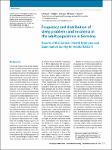Frequency and distribution of sleep problems and insomnia in the adult population in Germany
Results of the German Health Interview and Examination Survey for Adults (DEGS1)
Schlack, Robert
Hapke, Ulfert
Maske, Ulrike
Busch, Markus
Cohrs, S.
Sleep disturbances are associated with a variety of physical and mental health disorders and cause high direct and indirect economic costs. The aim of this study was to report the frequency and distribution of problems of sleep onset and maintaining sleep, sleep quality, effective sleep time and the consumption of sleeping pills in the adult population in Germany. During the 4 weeks prior to the interview, about one third of the respondents reported potentially clinically relevant problems initiating or maintaining sleep; about one-fifth reported poor quality of sleep. When additionally considering impairments during the daytime such as daytime fatigue or exhaustion, a prevalence of 5.7 % for insomnia syndrome was found. Women were twice as likely to be affected by insomnia syndrome as men. Significant age differences were not seen. Persons with low socioeconomic status had an increased risk of insomnia (odds ratio [OR] 3.44) as did people residing in West Germany (OR 1.53). Women with low socioeconomic status (OR 4.12) and men living in western German (OR 1.79) were more affected. The results illustrate the considerable public health relevance of insomnia-related sleep disturbances.
Dateien zu dieser Publikation
Keine Lizenzangabe

